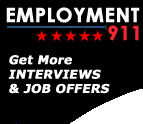| R�sum�s Win Interviews, References Win Job Offers |
|
Inquiring minds want to know, and no minds are more inquiring than those about to
hire you. Rest assured, you will be investigated. As a rule of thumb, the
better the job and the higher the pay, the tougher the screening process. If you are
up for a good job at a visible company, your references and past employers will be
checked in great detail. Your list of references is simply the beginning of the
investigation a prospective employer will conduct. When a prospective employer has completed the first round of interviews and you are among the top candidates, its next logical step is to check your references and interview those individuals to whom you reported. Are you certain these individuals will seal the deal for you, or will they blow it away? If you are like most people, you probably haven't given your references much thought. Instead, you have focused on your r�sum�, interviewing skills, networking, and what to wear to the interview. Now the focus shifts. Your biggest concern should be the quality of your references and recommendations from past employers, because they can make or break your chances. About half of all references that get checked range from mediocre to poor, so it is very possible that the great job you lost out on at the last moment had nothing to do with your skill level. It could have had more to do with what a reference or past employer said about you. So, if you are concerned that someone, somewhere, might be giving you a bum rap, you are probably right. That's a frightening scenario when your livelihood is at stake. Here is a sampling of the damaging comments HR people and line managers hear when they check references:
You are well advised to take more control of your career momentum by finding out what every potential reference will say about you. If the odds hold, as they will, those references will range from stellar to negative; yet when you know what someone is going to say about you, you can pass on your best references with greater confidence. You will also have the opportunity to stop references from saying things that are not true or inaccurate. Increasing Your Chances of a Good Reference. Here are some general rules of thumb to maximize the tone and accuracy of your references.
|
| HOW TO CHECK YOUR OWN REFERENCES |
|
A poor or even luke warm reference can sometimes cost you the job you want. If you
are worried about what a former boss will say to a prospective employer, consider
using a reference checking service as seen in the Wall Street Journal's National
Business Employment Weekly. The industry's leading and oldest reference checking
firm, Allison & Taylor, Inc. provides reference checks for job seekers that range
from $59 for basic to $99 for executive level reports. In business for 15 years,
Allison & Taylor will confidentially contact your references, inquiring about
performance - managerial skills, judgment, integrity, productivity, technical
skills - as well as employment dates, job description and reason for departure.
Within an average of ten days, you will have a complete dossier on your reference,
including how long it took for a response, general tone and verbatim quotes. For
additional information on this crucial service, call Terra Dourlain, Managing
Director, at 716-661-3478 or visit their comprehensive web site at
Allison & Taylor Reference Checking Written By: Terra Dourlain, Managing Director |
| Back to headlines page |


